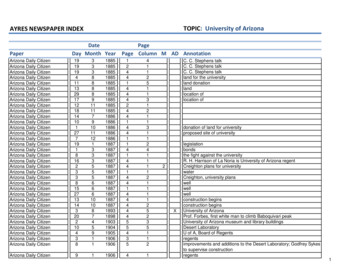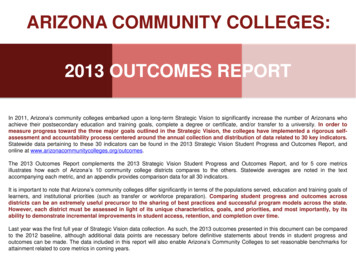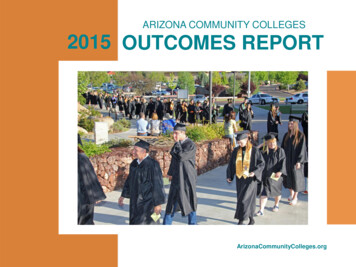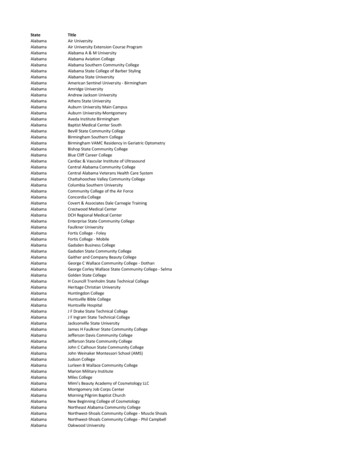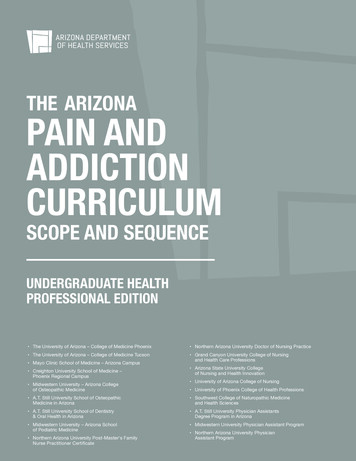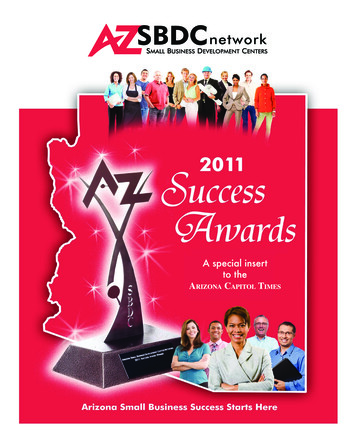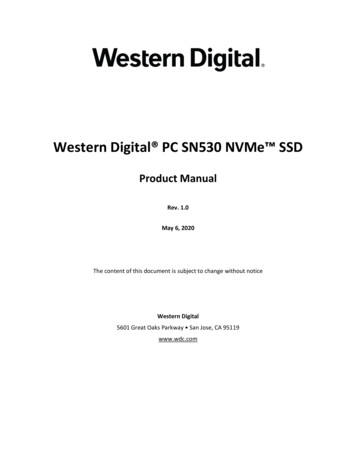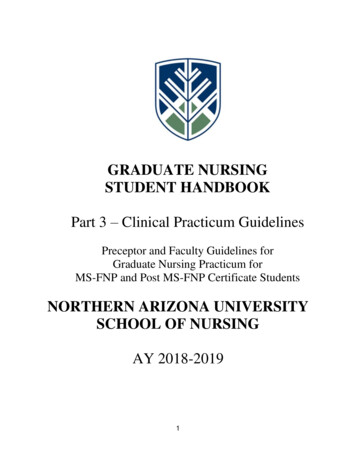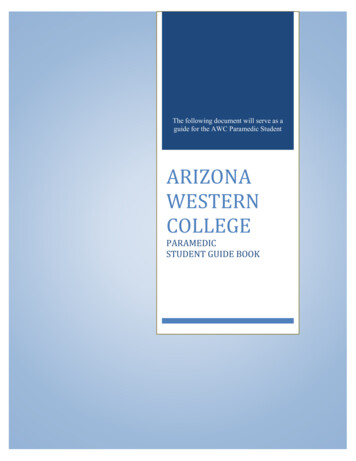
Transcription
The following document will serve as aguide for the AWC Paramedic StudentARIZONAWESTERNCOLLEGEPARAMEDICSTUDENT GUIDE BOOK3/171
3/172
Arizona Western College 2020 w Ave 8e Yuma, AZ 85365Phone: 317-6452 Fax:Joseph S. WaterfordDirector of Public SafetyArizona Western College2020 w Ave 8EYuma, AZ 85365928-210-9442Paramedic Student,Thank you for your commitment to public service, you will soon be giving up yourweekends and days off in an attempt to succeed in an unimaginably difficult and equallyrewarding Paramedic Program. Your enrollment into the Paramedic academy says a lotabout the type of person you are and who you want to be, this attitude and commitment iswhat our community seeks in its public safety personnel. Unfortunately, the aspiration tobecome a paramedic, alone, is not enough to ensure success. Unlike other vocationalclasses and academies who may boast 100% passing rates, in Paramedicine only those whoare 100% committed to their education, move onto actual certification. It is our intentionto provide you with our unwavering commitment to provide the best possible education;we hope to see the same level of commitment in you. We wish you all the best luck andhope to see all of you at graduation.Please feel free to contact us if you have any question.Sincerely,Joseph S. WaterfordProgram Director3/173
3/174
Table of ContentsOVERVIEW6Accreditation Status:7Our Mission8Description of the Paramedic Profession:9Roles and Responsibilities of the Paramedic Student:10Technical Standards:11Code of Conduct:12Certification:13Pregnancy:13Advanced Placement Policy:14Attendance Policy:14Social Media & Electronic devices:16Student Grievance:16Didactic18Curriculum:19Academic Competency Policy:20Academic Probation:21Counseling:21Resources:22Psychomotor Phases24Laboratory Phase:25Clinical Phase:26Field Internship:26Field Experience:27Team Lead Documentation:28Internship and Competency:28Operational Guidelines for laboratory, clinical and internship:29Contact List:333/175
OVERVIEW3/176
Accreditation Status:“The Arizona Western College Paramedic Academy is accredited by theCommission on Accreditation of Allied Health Education Programs(www.caahep.org) upon the recommendation of the Committee onAccreditation of Educational Programs for the Emergency Medical ServicesProfessions (CoAEMSP).”To Contact CAAHEP:Commission on Accreditation of Allied Health Education Programs25400 U.S. Highway 19 North, Suite 158Clearwater, FL 33763www.caahep.orgTo Contact COAEMSP:8301 Lakeview Parkway, Suite 111-312Rowlett TX 75088(214) 703-8445FAX (214) 703-8992www.coaemsp.org3/177
Our Mission“To prepare, competent entry-level, emergencymedical technician-paramedics, in the cognitive,(knowledge), Psychomotor (skills) and Affective(behavior) learning domains”3/178
Description of the Paramedic Profession:In 1998 the National Highway Traffic Safety Administration (NHTSA) released itsNational Standards Curriculum for the EMT Medical Technician Paramedic (EMTP). These standards define the first step in the design phase of the project in termsof general competencies and expectations. The Description of the Profession wasdrafted and underwent extensive community and peer review. It was designed tobe both practical and visionary, to not limit the growth and evolution of theprofession. Ultimately, it served as the guiding document for the curriculumdevelopment. The Description of the Profession also provided the philosophicaljustification of the depth and breadth of coverage of material.A paramedic has fulfilled certain prescribed requirements by a credentialingagency to practice the art and science of out-of-hospital medicine in conjunctionwith medical direction. The goal of a paramedic is to prevent and reduce mortalityand morbidity due to illness and injury by means of providing assessments andmedical care. Paramedics primarily provide care to emergency patients in an outof-hospital setting.Paramedics possess the knowledge, skills, and attitudes consistent with theexpectations of the public and the profession. Paramedics recognize that they arean essential component of the continuum of care and serve as linkages amonghealth resources.Paramedics strive to maintain high quality, reasonable cost health care bydelivering patients directly to appropriate facilities. As an advocate for patients,paramedics seek to be proactive in affecting long term health care by working inconjunction with other provider agencies, networks, and organizations. Theemerging roles and responsibilities of the paramedic include public education,health promotion, and participation in injury and illness prevention programs. Asthe scope of services continues to expand, the Paramedic will function as afacilitator of access to care, as well as an initial treatment provider.Paramedics are responsible and accountable to medical personnel’s direction, thepublic, and their peers. Paramedics recognize the importance of research andactively participate in the design, development, evaluation and publication ofresearch. Paramedics seek to take part in life-long professional development, peerevaluation, and to assume an active role in professional and communityorganizations.3/179
Roles and Responsibilities of the Paramedic Student:The Paramedic is the first line of advanced care for our communities, theprofession can be both demanding and rewarding. The program you have enrolledin is equally demanding, both in time and personal commitment, it is vital to yoursuccess that you put forth 100% effort in every aspect of the program. During youreducation you will be exposed to many different formats and styles of teaching,including lecture, group work, hands on training and scenario based education. Itis crucial that you place your best foot forward, in all settings; your actions in thisclass not only affect you, but your peers, and ultimately your patients.The most important responsibility you will encounter is your education; we willmake every attempt to provide you with the best resources; however youreducation is ultimately your responsibility. Every student must be well organizedand highly motivated, time management is a skillset of the upmost important.During the paramedic program “time” is a luxury that the Instructional team andstudent cannot afford; procrastination is a disease that quickly eats away at thesuccess of the program. We expect every student to set aside study time equal to1 ½ times the total number of hours spent in class. We understand that family isthe number one priority in every student’s life, for this reason we recommendfinding a way to integrate your family into your education in any way possible. Inevery program we find students at midterm reevaluating their commitment to theprogram due to the inability to spend time with their loved ones. This may very wellbe one of the most challenging aspects of the program. Many paramedic studentshave succeeded before you, all of them have found solutions to the many problemsyou will face please don’t hesitate to ask for advice.Professionalism is the cornerstone of the Paramedic Academy. We expect everystudent to behave in a manner that promotes the core values of any local PublicSafety Agency. The correct attitude can be the difference, your behavior in theclassroom, during clinical and field Internship is always a direct reflection on theprogram. You are always expected to be an ambassador to the paramedicprogram.All program requirements, including written, behavioral and practical evaluations,clinical and field internship requirements must be completed to be eligible forgraduation and certification testing. It is the responsibility of the Student tocomplete the Paramedic Training Program, including final testing and allclinical/vehicular requirements to be eligible for graduation, certification testing andNational Registry.3/1710
Technical Standards:The Paramedic Program at Arizona Western College is a rigorous and intense programthat places specific requirements and demands on the students enrolled in the program.The mission of the program is to provide students with the tools and structure needed todevelop basic and advanced skills to provide medical care to individuals in a variety ofsettings.The following abilities and expectations must be met by all students admitted to theParamedic Program. In the event a student is unable to fulfill these technical standards,with or without reasonable accommodation, the student will be dismissed from theprogram. AWC makes every attempt to outline these standards during the initialapplication process. In the event that a student’s abilities change, or a student is admittedwithout prior knowledge of any limitations they will dismissed.Compliance with the program's technical standards does not guarantee a student'seligibility for the NREMT or state certification exam. Students enrolled in the ParamedicProgram must demonstrate:1. The mental capacity to assimilate, analyze, synthesize, integrate concepts andproblem solve to formulate assessment and therapeutic judgments and to be ableto distinguish deviations from the norm.2. Sufficient postural and neuromuscular control, sensory function, and coordinationto perform appropriate physical examinations using accepted techniques; andaccurately, safely and efficiently use equipment and materials during theassessment and treatment of patients.3. The ability to communicate effectively and sensitively with patients and colleagues,including individuals from different cultural and social backgrounds; this includes,but is not limited to, the ability to establish rapport with patients and communicatejudgments and treatment information effectively. Students must be able tounderstand and speak the English language at a level consistent with competentprofessional practice.4. The ability to record the assessment results and subsequent treatment clearly andaccurately.5. The capacity to maintain composure and continue to function well during periodsof high stress.6. Flexibility and the ability to adjust to changing situations and uncertainty in clinicalsituations.3/1711
7. Affective skills and appropriate demeanor and rapport that relate to professionaleducation and quality patient care.8. Able to carry 100 pounds, (200lbs with assistance)Students in the paramedic program will be required to understand and meet thesetechnical standards or believe that, with certain accommodations, they can meet thestandards. If a student states they can meet the technical standards with accommodation,then the College will determine whether it agrees that the student can meet the technicalstandards with reasonable accommodation; this includes a review of whether theaccommodations requested are reasonable, taking into account whether accommodationwould jeopardize clinician/patient safety, or the educational process of the student or theinstitution, including all coursework, clinical experiences and internships deemedessential to graduation.Code of Conduct:The paramedic student will conduct themselves in a professional manner at all times.The paramedic academy is the first step in along a career that involves a high level ofpublic trust. The student will be exposed to situations that require professionalism, goodjudgment, and discretion. The Arizona Department of Health Services (ADHS) will requireyou to be “deemed of good character” prior to certification. The following conduct isrequired:1. Unprofessional conduct is not tolerated and is cause for immediate dismissal fromthe course. If any instructional staff member, preceptor, peer, or member of thegeneral public, observes committing an act of unprofessional conduct, a detailedwritten account of the incident will be submitted to the program director within 5business days.2. Students shall observe assigned classroom start and finish times. Tardiness andleaving early will count against maximum time missed. (see attendance policy)3. Classroom disruptions such as talking, or inattention will not be tolerated. Noncompliance will result in the individual being dismissed for the duration of the classand marked absent for the entire class. Further infractions will be deemedunprofessional conduct and the student will be dismissed from the program. Astudent’s behavior will not inhibit the learning of others.4. The use of tobacco is prohibited except in designated areas. All applicable lawsand local rules and regulations of the hosting facility must be followed includingdesignated areas for tobacco use.3/1712
5. Students are expected to treat every case scenario as real as possible. EveryStudent is required to act professionally crude comments, horseplay isunacceptable and shall be considered unprofessional conduct.6. You must wear gloves any time you are providing patient care or touching anotherperson during training (includes scenarios).7. Abuse or misuse of any piece of equipment, no matter its size or use, will not betolerated and shall be considered unprofessional conduct.8. Assignments must be turned in on time and completed. Late assignments will notbe counted for credit, but must be completed for course completion. Anyassignment turned in on time but incomplete will be treated as a late assignmentand not be counted.9. Each student is required to follow the paramedic program chain of command at alltimes. If unable to resolve an issue, you should contact the instructor. If stillunresolved, you may submit a written incident report to the Paramedic ProgramDirector. Failure to follow the chain of command shall constitute unprofessionalconduct.10. The use of cell phones including texting is strictly prohibited during scheduledclassroom and clinical/internship hours. Students may use their phones duringassigned breaks. Students in violation of this policy will be immediately asked tostop; further incidents will result in the student being dismissed for the remainderof the day. Missed time will count against the student’s total allowable missedhours as outlined in “Attendance Policy.”11. Be nice!Certification:Students must maintain a valid Arizona EMT certification at all times. Failure to do so willresult in immediate dismissal from the program.Pregnancy:Arizona Western College is committed to protecting its pregnant paramedic students fromhealth and safety hazards that are known to be present in the health care environment.Students who are pregnant are required to follow the subsequent procedures.1) Disclosure:a. As soon as the paramedic student learns that she is pregnant, she must reportthe pregnancy to the program director. The student must complete andsubmit a medical-health form signed by her healthcare provider to theprogram director. The form will include estimated due date and confirmationthat paramedic program clinical and internship work may be performed. Any3/1713
subsequent change in status must be documented by the healthcare providerand submitted to the program director. Any contraindications must be stated.2) Infectious Disease Precautionsa. A pregnant paramedic student should not receive a TB skin test, chest x-ray or any vaccine without consulting her physician.b. A pregnant paramedic student may not have contact with a known orsuspected teratogen.c. Paramedic students who may be pregnant are restricted fromadministering cytotoxic agents or caring for patients who receivethese agents.3) Precautions for Working in Radiation Environmentsa. A pregnant paramedic student must refrain from any patient careenvironment in which radiation is present.4) Post-pregnancy Follow-upa. A paramedic student must submit a follow-up medical-health exam formproviding a statement from the healthcare provider. This statement shouldconfirm that the student may return or continue the paramedic clinical workbeing performed without any contraindications.5) Withdrawala. If the clinical work is contraindicated either during pregnancy or post pregnancy theparamedic student must withdraw from the program and may request readmission asdetailed in the Readmission Policy found in the AWC Couse catalog.Advanced Placement Policy:Arizona Western College does not award any advance placement for students in theparamedic program. In addition, the paramedic program does not award credit forexperiential learning.Attendance Policy:1. Attendance at all class sessions is MANDATORY.3/1714
a. If you have an unavoidable absence, you must contact the program directoror instructor the of day, or as soon as possible.b. You must submit a “Lesson Absence Form” for the class missed, prior to dateassigned by the instructor. Time missed cannot be made up; content missedmust be made up.c. You are only permitted to miss a total of 16 hours of class time for eachsemester of the Paramedic program. (ADHS mandatory requirement)2. Attendance at all CLINICAL rotations is MANDATORY – Clinical rotations must becomplete prior to the official end date of the program.a. Failure to complete all clinical objectives prior to the program end date willresult in a failing grade.b. Additional clinical hours may be assigned as necessary to ensure clinicalcompetence.c. Extensions will not be assigned due to a lack of hours.3. Attendance at all Internship rotations is MANDATORY – Internship rotations mustbe complete prior to the official end date of the program.a. You must complete all internship objectives for successful completion of theprogram.b. Additional clinical hours may be assigned as necessary to ensure clinicalcompetence.c.Extensions will not be assigned due to a lack of hours.4. Deployable Personnel Students who are involved in any position or capacity thatmay require them to deploy must adhere to the attendance policy.a. Deployment will be defined as any assignment that may require that thestudent to miss more than the allotted time in the program.b. Deployable positions include but are not limited to: 3/17Active duty military personnelMilitary reservistWildland firefightersDisaster medical assistance (DMAT) teams15
Students are required to meet all program requirements. This includes mandatoryattendance policy, clinical and internship requirements as outlined above.Social Media & Electronic devices:The term “social media” is a blanket term that is used to describe any media sharingapplication; i.e. Facebook, Twitter, LinkedIn, Instagram, YouTube and othersStudents must follow the same behavioral standards when online and in real life. Thesame laws, professional expectations and guidelines. Patient information obtained duringthe course of this program is completely confidential without exception. Theorganizational (internal and external) information you may see or hear during yourclinical/field internship is considered confidential and should not be shared via any socialmedia platforms.All lectures are the sole intellectual property of the instructor conducting the lecture; nounauthorized recording, photographs, drawings, voice, or visual representation ispermitted without the permission of the instructor.Laptops and tablets are allowed during the program, however if in the opinion of theinstructor the students attention is being taken away for the topic the instructors reservethe right to ask that device be stowed away. Students are fully and completely responsibleand liable for anything posted to any social media platform. Sharing information that isconfidential shall result in immediate dismissal from the program.Student Grievance:Every student has an equal opportunity to receive education through the Arizona WesternCollege Paramedic Program. If at any time a student feels that the actions or decision ofany other student, instructor or faculty member has violated a student’s right to theaforementioned, they have the right to seek a resolution. The following system is to beutilized when seeking a resolution:1. The student should seek an immediate resolution by communicating with any otherparty involved. It is assumed that most conflicts can be resolved through effectivecommunication. Communication must take place at a time that does not affect theeducation of other students. If the conflict is not resolved continue to step 2.2. If a resolution cannot be resolved by communication in step one, the student mustcontact the program director and advise them of the issue. It must be articulatedto the program director that the student has a grievance and all appropriate detailsare passed on. The program director will take all information, interview all partiesinvolve, and issue a resolution.3/1716
3. If a resolution cannot be met, or if the grievance is against the program director, awritten statement of grievance must then be issued to the Dean of CTE. The Deanof CTE will then interview all parties involved and seek a resolution. The Dean ofCTE resolution will stand as the final resolution for the program. The programdirector shall inform the Dean of Career and Technology Education of anygrievance and their outcome.Students shall follow the chain of command of the program to resolve the issue. If astudent disagrees with the resolution through the chain of command established in theprogram, they are entitled to utilize the Arizona Western College’s grievance policy forstudents. All grievances must be presented in writing within 5 business days of the incitingincident.3/1717
Didactic3/1718
Curriculum:AWC’s Paramedic program utilizes the National EMS Education Standards as theFramework behind the curriculum. These Standards allow for flexibility throughout theprogram but still provide the structure needed to deliver the objectives set forth by theNational Highway Traffic Safety Administration. The following is an excerpt from theNational EMS Education Standards, it can be found in its entirety at WWW.EMS.GOVExecutive SummaryThe National EMS Education Standards (the Standards) represent another step towardrealizing the vision of the 1996 EMS Agenda for the Future, as articulated in the 2000 EMSEducation Agenda for the Future: A Systems Approach.The National EMS Education Standards outline the minimal terminal objectives for entrylevel EMS personnel to achieve within the parameters outlined in the National EMS Scopeof Practice Model. Although educational programs must adhere to the Standards, itsformat will allow diverse implementation methods to meet local needs and evolvingeducational practices. The less prescriptive format of the Standards will also allow forongoing revision of content consistent with scientific evidence and community standardsof care.In implementing the Standards, EMS instructors and educational programs will have thefreedom to develop their own curricula or use any of the wide variety of publishers’ lessonplans and instructional resources that are available at each licensure level. Consistent withthe EMS Education Agenda, EMS accreditation authorities will use the Standards as theframework for evaluation of program curricula.The National EMS Education Standards are not a stand-alone document. EMS educationprograms will incorporate each element of the education system proposed in the EducationAgenda. These elements include: National EMS Core ContentNational EMS Scope of PracticeNational EMS Education StandardsNational EMS CertificationNational EMS Program AccreditationThis integrated system is essential to achieving the goals of program efficiency, consistencyof instructional quality, and student competence as outlined in the Education Agenda.3/1719
Academic Competency Policy:Arizona Western College has a strong commitment to the EMS system and has adopteda very high academic standard for graduates of the EMS programs:1. You must complete the course with a minimum 80% cumulative grade tosuccessfully complete the course.2. You must pass each examination with a minimum of 80%. One retest shall bepermitted on an examination. The retest shall be graded on a pass/fail basis (80%minimum) and a score of 80% shall be utilized in computing your GPA.3. Failure of an examination retest shall constitute failure of the course and immediatedismissal; the student may not attend or audit any further class sessions.4. There will be quizzes and assigned homework on a regular basis.5. You must pass the Midterm and Final Written examinations with an 80%. Oneretest shall be allowed on the midterm and final written examination.6. You must pass all embedded certification courses. [Note: Failure of an embeddedcourse will constitute failure of the program]7. You must pass a comprehensive final practical examination to successfullycomplete the course. One retest shall be allowed on the final skills examination.The final practical will be conducted according to National Registry StandardsGRADING SYSTEM: A grade of 80% or above is required to pass this course:A 90% - 100%B 80% - 90% 80 is FAILUREWeighted grade breakdown:Homework- 10%Test-60%Quiz-10%Final/Midterm-20 %3/1720
Academic Probation:A student who fails to meet the minimum academic competency standard on any twotests during the program will be placed on academic probation. A failure to meet theacademic competency standard is defined as: failure to score an 80% or above on anyexam throughout the program. Academic Probation will commence immediately followingthe second failure to reach the academic standard on an exam, and will continue throughthe end of the semester.The program director will meet and counsel the student who is placed on academicprobation. Together the program director and the student will to determine a plan forremediation. The student and the instructors will work together in any way possible toinsure academic competency for the student. A student who is currently on academicprobation, and who also fails to meet the academic competency standard on anysubsequent test will be dismissed from the program.Counseling:Students shall conform to the standards of the Paramedic Academy. When a student failsto achieve the minimum standards of performance established for the program they willbe counseled. Continued failure to meet established minimums will result in dismissalfrom the program.1. The counseling session will utilize approved forms and guidelines.2. The counseling session may include, for example, mutual identification ofdeficiencies and a plan for remediation. Mutual goals and activities that comprisean action plan may be decided on.3. All student counseling’s will be documented.4. A plan for improvement will be developed and explained to the student. This willbe documented on the evaluation instrument. A copy of the documentation maybe reviewed and will be retained in the student’s permanent training record.5. If the sub-standard performance is judged to be of a serious or repetitive nature,the program director will utilize a formal disciplinary procedure.6. The Arizona Western College Paramedic Program will utilize progressivedisciplinary counseling. The progression is as follows:a. Verbal counselingb. Written reprimandc. Dismissal3/1721
Resources:Arizona Western College’s Paramedic Program is committed to providing our studentswith every possible avenue for success. During the Paramedic Program students will beexposed to multiple Instructors, styles and instructional methodologies. The programgives each instructor the autonomy to present their lectures in the fashion they believewill be best suited for the topic, the students, and the program as a whole. Each studentlearns differently it is the responsibility of the instructor to provide each student with theopportunities to learn and master each topic.BooksThe books used in the paramedic program are the cornerstone of your education; ourcurriculum is modeled after two publications, National Emergency Medical EducationStandards (who writes the curriculum) and the Brady series of books (who interprets thecurriculum). Your books are the authority on all information during the program, anydiscrepancy, between any two sources, is always settled by referring back to the textbook. Each student will be required to carry with them only the book we are currentlylecturing from.LectureThe largest portion of all instruction is given through lecture; lecture may be presented ina multitude of formats. It would be unrealistic to expect every aspect of the chapter to bepresented; it is the responsibility of the student to read and understand the chapter’scontent.ScenariosThe instructional staff will be integrating the use of scenarios in every lecture possible.The scenarios utilized will serve to create a bridge between the didactic and fieldinternship. Through scenarios instructors can better judge the level of understanding thatthe student currently holds.VideoInstructors will utilize videos to help facilitate the learning of a skill, procedure or topic.Many of the videos used are available for the students viewing at any time, via YouTube and other student media based sites.SkillsAny skill that the Student will be required to complete in the field will be performed underthe supervision of approved instructors in the program. Those skills that can be performedon other students, such as IV’s, glucometer, and EKG placement will be completed in thismanner. Other skills such as intubation, defibrillation, IV medication administration, andtranscutaneous pacing will only be performed on appropriate mannequins and trainingdevises. Any skill that will be performed on a patient or student must be mastered in theclassroom prior to attempting during patient care.3/1722
Student based MediaThere are a large number of student based resources available to assist students in theireducation. The Arizona Western College Paramedic Program is committed to providingstudents with as many resources as possible to assist in their education. Any otherwebsites that you may find helpful, please share them with one another; all we ask is thatstudents give the instructors an opportunity to review these we
Arizona Western College 2020 w Ave 8e Yuma, AZ 85365 . Phone: 317-6452 Fax: Joseph S. Waterford . Director of Public Safety . Arizona Western College . 2020 w Ave 8E . Yuma, AZ 85365 . . Commission on Accreditation of Allied Health Education Programs . 25400 U.S. Highway 19 North, Suite 158 . Clearwater, FL 33763. www.caahep.org . To Contact .
